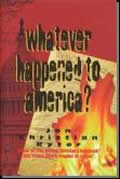Other
Ryter
Articles:
PLANS TO SURRENDER "CONTROL" OF THE INTERNET TO THE UN TEMPORARILY SHELVED
By Jon Christian Ryter
November 16, 2003
NewsWithViews.com
International critics of what is increasingly being viewed as Anglo-American control over every facet of life in the world have been demanding that the United States surrender its "control" over Internet licensing of websites through California-based ICANN (the Internet Corporation for Assigned Names and Numbers). The developing nations want controls assigned to an unbiased international organization. There has been a quiet (in the United States) debate over this issue for several months between the industrialized nations and the United Nations, based on complaints from several developing economies that the United States unilaterally controls the access to the information superhighway and thus uses it as a political devise to promote its free market economy capitalist agenda.
Attempts on the part of several developing nations including Brazil, India, South Africa, China, North Korea, Cuba and Saudi Arabia to wrest management control of the Internet away from the United States and assign it to an international body through the United Nations were temporarily shelved on November 8 according to the Financial Times of London. (Management control means that the UN would exercise control over assigning [or not assigning] ISPs and the licensing of domain names and URLs to applicants seeking to launch commercial, political or personal websites.) A group of African nations led by Senegal expressed concern to the UN that their voices have been lost or simply are being ignored by the powerful economic nations. Others fear that communist nations like China, North Korea and Cuba view the Internet primarily as a propaganda devise of the industrialized nations. They would, if able to do so, use American ownership to justify censorship thereby stifling the voices of their people from communicating with the world.
The discussion, according to the Financial Times, was one of whom should ultimately manage the Internet. Should it be the quasi-free enterprise (yet wholly-funded by and partially U.S. government-owned) ICANN, or should it be an international NGO, or the UN itself? Those arguing for UN control advocate using the International Telecommunications Union (the UN agency that is organizing the UN Summit on the Information Society that will meet next month). This was one of the bones of contention discussed last week in Geneva, Switzerland. These discussions were preparatory talks that will frame the agenda of the UN World Summit that will take also take place in Geneva on December 10th, 11th and 12th.
The questions that are expected to be posed at the UN Summit are, first: "Should key decisions on how the Internet is managed and controlled remain in the hands of the United States government, or should it be surrendered to the United Nations where it will be controlled by a consortium of nations?" That consortium of nations, of course, will be the third world nations that currently control the political structure of the United Nations. Second: "Should a fund be established to provide money to address the technology gap between the rich nations and the poor ones? And, where will this money come from if not from an assessment on Internet usage?" The UN has been trying since 1996 to impose a global tax of some type. The UN Charter does not give the UN authority to tax anyone. Of course, the central government of the newly formed United States of America lacked the authority to tax the incomes or accrued wealth of the American people when the union of States was organized in 1787. The only taxes it could legally assess were excise taxes and tariffs.
Yet, today the federal government of the United States has unconstitutionally granted itself the right to confiscate, through illegal taxation, up to 60% of the gross wages of America's affluent upper middle class. Once the nations allow the UN to exercise a power it does not legally possess to tax the workers of the world, precedent will allow them to steal not only the jobs of the middle class workers of the world, but their accrued wealth as well. Andrew McLaughlin, a former ICANN official who is now a fellow at Harvard University (who advises on global telecommunications policy), is convinced the UN Summit will be nothing more than "...a blabberfest that is not likely to produce results." I think McLaughlin is wrong because the globalists cannot afford to leave such a powerful tool--unbridled communications rights--unregulated as they search for ways--both legal and illegal--to dissolve all of the world's national boundaries as a necessary first step in the century-old blueprint to establish a stateless global community with its international capitol located in Brussels.
Under attack from the third world and the former communist bloc nations, America is being bullied by its European "allies"--Germany and France--who are leading the charge to force the United States to surrender management of the information super highway to the socialist ideologs who want to control not only the on-ramps to the cyber-highway, but the ability of those governments wanting to do so to regulate who has access to the Internet for security reasons. The French and Germans argued that the Americans allowed hate-mongers to exploit what they insist has become the world's most important communications portal. The United States and the European Union are vigorously defending the status quo. The U.S. delegation in Geneva argued that surrendering the management control of the Internet to the third world powers that now control the UN, or to totalitarian governments which treat their populations as human chattel, is an absurd idea. It would result in nationalistic or ideological barriers being placed, like roadblocks, along what has always been a borderless information super highway. It would stifle the free flow of information and the simple exchange of ideas between various peoples in various nations.
Even if the United States and its industrialized allies successfully derail the initial efforts of the developing nations to wrest control of the Internet from ICANN, those nations will ultimately co-opt any understanding. The developing nations, who are using the UN Summit on the Information Society as a means to establish a cohesive global policy on information technology beneficial only to them, intend to make sure that whatever treaty or accord is ultimately agreed upon will grant the UN unilateral authority to implement what Americans will view as unacceptable restrictions and censorship over Internet use. Invoking the privileges of national security, Cuba has already introduced a motion that would allow the nation's governments to filter Internet content into their nations and impose censorship on privately-owned websites.
The argument advanced by the developing nations is that the United States has not been able to stop either pornography or hate websites and, thus, the nations of the world must be afforded the right to protect their citizens from exhibitionists and extremists alike. Tons of spam--much of it originating from the very nations that want to manage the on-ramps of the Internet by making them limited access toll booths--fill our inboxes daily. Much of the spam the secularist globalists and extremist theological ideologs call "hate mail" comes from Christian America and is viewed by the utopians as theological extremism (the Judeo-Christian view vs. Islam). It is spam from the conservative and religious right in America that is making it difficult for the United States and its economic allies in Europe to defend their position that they are the world's best caretakers of the cyber highway.
But what is most troubling in the discussion over Internet management control (that very likely will be shelved during the December UN Summit on the Information Society) is that those debating the question of who should control access to the Internet, are also fighting among themselves on how to create what they call a "digital solidarity fund" (i.e., a global tax at the on-ramp of the Internet)--that will likely be assessed through your Internet service provider. The proposed tax on Internet users would be limited to what the UN describes as the "rich" nations. The UN's digital solidarity tax would be used to bridge the "digital divide" between the affluent and emerging nations. Also on the December Summit agenda are unresolved questions concerning intellectual property rights (i.e., copyright protection) and free access to that information or technology. Key on the UN agenda is the question of the acceptable boundaries to freedom of expression.
Thus far, over 50 heads of state
have signaled their intent to attend the December conference. At that
UN Summit the attendees are expected to set broad guidelines on the
governance of the global information super highway that will be hammered
into a set of international regulations when the UN Summit on the
Information Society meets again in Tunisia in 2005.
Jon Christian Ryter is the pseudonym of a former newspaper reporter with the Parkersburg, WV Sentinel. He authored a syndicated newspaper column, Answers From The Bible, from the mid-1970s until 1985. Answers From The Bible was read weekly in many suburban markets in the United States.
Today, Jon is an advertising executive with
the Washington Times. His website, www.jonchristianryter.com
has helped him establish a network of mid-to senior-level Washington insiders
who now provide him with a steady stream of material for use both in his
books and in the investigative reports that are found on his website.
E-Mail: baffauthor@aol.com
"Yet, today the federal government of the United States has unconstitutionally granted itself the right to confiscate, through illegal taxation, up to 60% of the gross wages of America's affluent upper middle class. Once the nations allow the UN to exercise a power it does not legally possess to tax the workers of the world, precedent will allow them to steal not only the jobs of the middle class workers of the world, but their accrued wealth as well."






